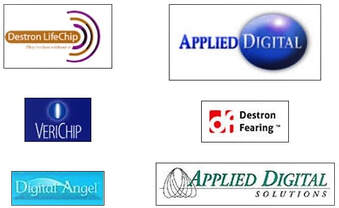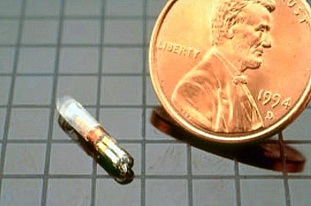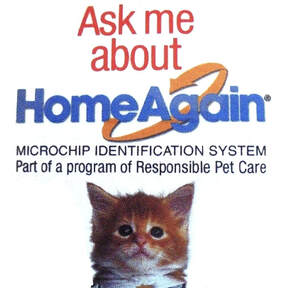|
Company: Applied Digital Solutions Inc. (ADS) Subsidiaries: Digital Angel Corp., Verichip Corp, Destron Fearing Corp. Based: Delray Beach, FL. Founded: 1993 Founders: Richard J. Sullivan Specialty: RFID microchips and electronic ear tag transponder systems used for livestock asset management, disease control and food safety. A world leader in wildlife, fish and domestic pet animal monitoring markets. Pioneering developer of patient monitoring devices, including the VeriChip transplantable microchip for humans. Developed the Digital Angel™, Thermo Life™ and VeriChip™. |
Destron Fearing LifeChip RFID Implant Microchip for livestock and animals (2001)
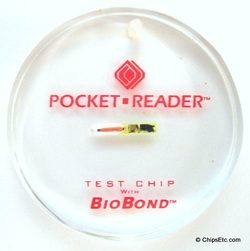
Item #801
This Keychain features an actual Destron Fearing RFID (radio frequency identification device) Test microchip embedded in Lucite. Destron Fearing was a pioneer in developing RFID microchips to the livestock industry.
Destron Fearing of Eagan, MN, was founded back in 1945 as an livestock identification company, producing animal ear tag ID's.
In 2007, The United States Department of Agriculture announced that Destron Fearing's "LifeChip" Implanted RFID microchips were approved for use as part of the National Animal Identification System (NAIS).
The LifeChip not only provided animals with a unique 15-digit identification & tracking code, it was also offered with their "Bio-Thermo" technology which was capable of providing real-time, non-evasive, body temperature measurement data.
Initial glass-enclosed microchips designs were prone to migration once implanted in animal tissue. Destron Fearing solved this problem with their patented "Bio-Bond process" which coated the implanted Microchip glass in a porous polypropylene polymer which anchored the microchip to the desired anatomical site.
In 2000, Applied Digital Solutions acquired the Destron Fearing Corporation. In 2011, Destron Fearing became a subsidiary of Digital Angel Corp., another pioneer of implantable RFID microchips.
More than three million animals worldwide have now been injected with Microchip transponders manufactured by Destron Fearing.
Destron Fearing's LifeChip branded microchips are now marketed across the Asia-Pacific region (Australia / New Zeeland) exclusively by a leading animal identification systems company called Digivet. (for identification of household pets, livestock and horses)
Destron Fearing of Eagan, MN, was founded back in 1945 as an livestock identification company, producing animal ear tag ID's.
In 2007, The United States Department of Agriculture announced that Destron Fearing's "LifeChip" Implanted RFID microchips were approved for use as part of the National Animal Identification System (NAIS).
The LifeChip not only provided animals with a unique 15-digit identification & tracking code, it was also offered with their "Bio-Thermo" technology which was capable of providing real-time, non-evasive, body temperature measurement data.
Initial glass-enclosed microchips designs were prone to migration once implanted in animal tissue. Destron Fearing solved this problem with their patented "Bio-Bond process" which coated the implanted Microchip glass in a porous polypropylene polymer which anchored the microchip to the desired anatomical site.
In 2000, Applied Digital Solutions acquired the Destron Fearing Corporation. In 2011, Destron Fearing became a subsidiary of Digital Angel Corp., another pioneer of implantable RFID microchips.
More than three million animals worldwide have now been injected with Microchip transponders manufactured by Destron Fearing.
Destron Fearing's LifeChip branded microchips are now marketed across the Asia-Pacific region (Australia / New Zeeland) exclusively by a leading animal identification systems company called Digivet. (for identification of household pets, livestock and horses)
Digital Angel 134 kHz RFID HomeAgain Pet Microchip (2007)
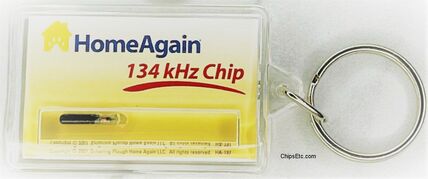
Item #1020
This Acrylic Keychain from pharmaceutical firm Schering-Plough (a distributor / marketer of the HomeAgain™ pet microchip identification system) features a 134 kHz implantable RFID chip made by Digital Angel.
In 2007, HomeAgain would start transitioning from using Digital Angel's 125 kHz microchips, to the ISO standard 134 kHz microchips.
Digital Angel Corp., based in South Beach, FL., a pioneer and inventor of the implantable microchip, was acquired by Applied Digital Solutions (ADS) in 1999. In 2011, animal microchip pioneer Destron Fearing became a subsidiary of Digital Angel.
In 1993, Destron IDI & Hughes Identification Devices (HID), a subsidiary of Hughes Aircraft Company, was awarded the first patent #5211129 for a Syringe implantable identification transponder, invented by engineers Vern Taylor, Daniel Koturov, John Bradin and Gerald E. Loeb.
In 2002, Digital Angel Corporation was Awarded a United States Patent #6,400,338
for their Next-Generation, Enhanced-Performance Implantable Microchip that used a proprietary "unitary core" design. for a passive integrated transponder tag with unitary antenna core, invented by Ezequiel Mejia and Sean Casey, which built on the Destron / IDI Implantable Microchip Patent from 1991.
In 2006, Digital Angel was awarded patent No. 7,125,382 for an "Embedded Bio-Sensor System, which would be marketed as an Implantable RFID Glucose-Sensing Microchip for Humans.
HomeAgain Cat and Dog microchips are one of the most popular pet identification microchips and recovery systems recommended by vets in the U.S.. HomeAgain is now owned by Intervet Inc., a subsidiary of Merck & Co., Inc.
In March 2019, Merck teamed up with the American Quarter Horse association (AQHA) to promote the microchipping of horses with their HomeAgain "TempScan" chip and registration in their online animal registry database. The pilot program was to microchip horses to help with recovery from theft, after disasters, and provide required identification during Equine competitions. The TempScan microchip also provided real-time information of the horses body temperature when being scanned, helping to identify contagious and potentially fatal equine diseases.
VeriChip - First human implantable Microchip (2002)
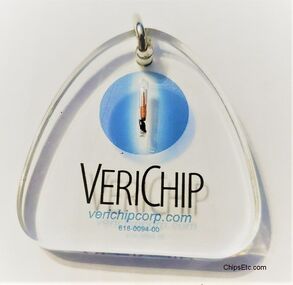 Item #1021
Item #1021
This Lucite keychain from VeriChip contains one of their implantable RFID chips.
In 2002, Applied Digital Solutions and Digital Angel introduced an injectable microchip, called the VeriChip. In 2004, they received excusive FDA approval for the use of the Verichip microchip as an injectable implant in humans.
The glass encased VeriChip transponder was designed to hold a 16-digit identification number that could provide vital health information in emergency situations when the patient was unable to remember, or communicate information themselves (such as autism patients).
The injectable microchip transponder was 11 mm by 1 mm in size, about the size of a grain of rice.
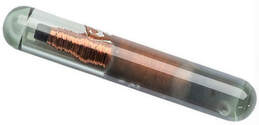 Modern version of the VeriChip implant microchip transponder (2021)
Modern version of the VeriChip implant microchip transponder (2021)
